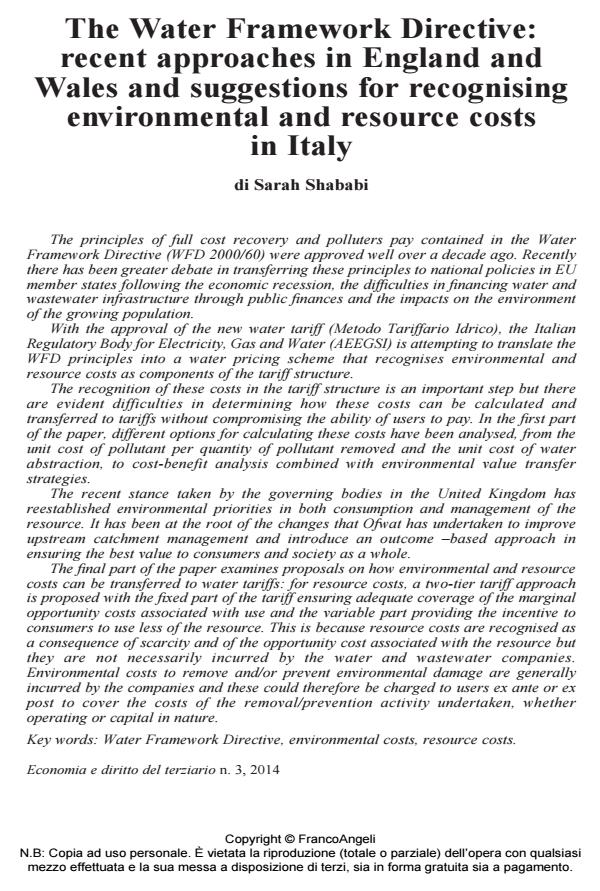The Water Framework Directive: recent approaches in England and Wales and suggestions for recognising environmental and resource costs in Italy
Journal title ECONOMIA E DIRITTO DEL TERZIARIO
Author/s Sarah Shababi
Publishing Year 2015 Issue 2014/3
Language Italian Pages 21 P. 367-387 File size 150 KB
DOI 10.3280/ED2014-003004
DOI is like a bar code for intellectual property: to have more infomation
click here
Below, you can see the article first page
If you want to buy this article in PDF format, you can do it, following the instructions to buy download credits

FrancoAngeli is member of Publishers International Linking Association, Inc (PILA), a not-for-profit association which run the CrossRef service enabling links to and from online scholarly content.
The principles of full cost recovery and polluters pay contained in the Water Framework Directive (WFD 2000/60) were approved well over a decade ago. Recently there has been greater debate in transferring these principles to national policies in EU member states following the economic recession, the difficulties in financing water and wastewater infrastructure through public finances and the impacts on the environment of the growing population. With the approval of the new water tariff (Metodo Tariffario Idrico), the Italian Regulatory Body for Electricity, Gas and Water (AEEGSI) is attempting to translate the WFD principles into a water pricing scheme that recognises environmental and resource costs as components of the tariff structure. The recognition of these costs in the tariff structure is an important step but there are evident difficulties in determining how these costs can be calculated and transferred to tariffs without compromising the ability of users to pay. In the first part of the paper, different options for calculating these costs have been analysed, from the unit cost of pollutant per quantity of pollutant removed and the unit cost of water abstraction, to cost-benefit analysis combined with environmental value transfer strategies. The recent stance taken by the governing bodies in the United Kingdom has reestablished environmental priorities in both consumption and management of the resource. It has been at the root of the changes that Ofwat has undertaken to improve upstream catchment management and introduce an outcome based approach in ensuring the best value to consumers and society as a whole. The final part of the paper examines proposals on how environmental and resource costs can be transferred to water tariffs: for resource costs, a two-tier tariff approach is proposed with the fixed part of the tariff ensuring adequate coverage of the marginal opportunity costs associated with use and the variable part providing the incentive to consumers to use less of the resource. This is because resource costs are recognised as a consequence of scarcity and of the opportunity cost associated with the resource but they are not necessarily incurred by the water and wastewater companies. Environmental costs to remove and/or prevent environmental damage are generally incurred by the companies and these could therefore be charged to users ex ante or ex post to cover the costs of the removal/prevention activity undertaken, whether operating or capital in nature.
I principi di full cost recovery e "di chi inquina paga" contenuti nella Water Framework Directive (WFD 2000/60) sono stati promulgati da oltre un decennio. Tuttavia recentemente si è aperto maggiormente il dibattito sul trasferimento di tali principi nelle politiche nazionali degli Stati Membri dell’Unione Europea, in particolare a seguito delle problematiche nel finanziamento delle infrastrutture idriche e delle pressioni sull’ambiente. Con l’approvazione del nuovo Metodo Tariffario Idrico, l’Autorità per l’Energia Elettrica, il Gas e il Sistema Idrico ha dato impulso al trasferimento dei principi della WFD in una tariffa che riconosca i costi ambientali e i costi della risorsa. Il riconoscimento di tali costi in tariffa è un passo importante, ma vi sono evidenti difficoltà nella determinazione, nel calcolo e nel trasferimento di tali costi in tariffa senza compromettere la capacità degli utilizzatori del servizio di pagare. Nella prima parte del paper si passano in rassegna diverse metodologie per il calcolo di tali costi, dal costo di rimozione per unità di massa inquinante al costo marginale di estrazione idrica, dalle analisi di costi-benefici alle strategie di trasferimento del valore ambientale. La recente presa di posizione governativa nel Regno Unito ha ristabilito le priorità ambientali nella gestione e nel consumo della risorsa. Questa posizione sta alla radice dei cambiamenti che Ofwat ha intrapreso per migliorare la gestione dei bacini idrografici e per introdurre un approccio output-based nell’assicurare agli utilizzatori e alla società la ottimizzazione del servizio. La parte finale del lavoro analizza alcune proposte di trasferimento dei costi ambientali e della risorsa in tariffa: per quanto riguarda i costi della risorsa, una tariffa a due livelli, una componente fissa che assicuri copertura adeguata al costo marginale di utilizzo della risorsa e una componente variabile che incentivi i consumatori a contenerne l’uso. Questo perché i costi della risorsa, determinati come costo opportunità, sono una conseguenza della scarsità della stessa e non devono necessariamente essere sostenuti dai gestori. I costi ambientali invece vengono generalmente sostenuti dai gestori per la rimozione o la prevenzione di un danno ambientale e potrebbero essere imputati direttamente ai consumatori ex ante o ex post per coprire i costi dell’attività intrapresa.
Keywords: Water Framework Directive, environmental costs, resource costs.
Jel codes: L 95G3.
Sarah Shababi, The Water Framework Directive: recent approaches in England and Wales and suggestions for recognising environmental and resource costs in Italy in "ECONOMIA E DIRITTO DEL TERZIARIO " 3/2014, pp 367-387, DOI: 10.3280/ED2014-003004